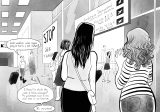Feminist Futures Lecture Series: Fall 2016
When sex tourism goes ‘graphic’
By Marie-Eve Carrier-Moisan
September 27, 2016 1:00-2:30p.m., Room 2017 Dunton Tower

Illustration by Débora Santos
Abstract
In this talk, I reflect on the process of adapting my ethnographic research on sex tourism in Brazil into graphic novel form. Informed by feminist and ethnographic engagements with visual research and methodologies, I discuss the potential and limitations of this medium for knowledge production, and the kind of ethical-political conundrums it generates. I also explore some of the affinities between ethnography and the graphic novel medium, and reflect on the capacity of graphic novels to generate multiple meanings, address complex and difficult subject matter, offer unique insights into the shifting and situated experiences of the protagonists, and render the experiences of the protagonists relatable and comprehensible. Graphic novels are in many ways unique in how they combine text/image to create meaningful stories – but the genre nonetheless poses challenges for processes of knowledge production and representation. Images may evoke, provoke and open our imagination; but, similar to words and text, they can reduce and dilute meanings as well. Finally, I also engage with the ‘affective capacity’ of graphic novels, namely, their capacity to generate, mediate and organize particular affects – an aspect that becomes particularly salient in the context of my work, given that sex tourism is already mediated by visual affective politics.
______________________________________________________________________________________________________________________________________________________
Gringo Gulch: Sex, tourism, and social mobility in Costa Rica
By Megan Rivers-Moore
October 18, 2016 1:00-2:30p.m., Room 2017 Dunton Tower
Gringo Gulch considers the meanings that are made from participation in the sex industry, exploring how the purchase and sale of sex in San José, Costa Rica allows certain kinds of social and economic mobility for those involved. Focusing on the experiences of sex tourists, sex workers, and state employees, the book considers how the geopolitics of transnational tourism are played out in the embodied labour of sex workers and how the specific configurations of the sex industry in San José are tied to a variety of local, national, and global processes that reflect and produce particular intersections of gender, race, sexuality, and class.
______________________________________________________________________________________________________________________________________________________
Angry Young Nerds: Geek Culture and Toxic Masculinity
By Benjamin Woo, School of Journalism and Communication
November 29, 2016 1:00-2:30p.m., Room 2017 Dunton Tower

If geek culture has often been imagined as a place indifferent or unfriendly to women, then it has looked downright hostile in recent years. From online harassment campaigns targeting prominent women in geek cultural industries to mass shootings explicitly framed in misogynistic “men’s rights” discourses, a certain segment of nerds and geeks have embraced a particularly toxic form of masculinity. However, it wasn’t so long ago that nerds and geeks promised something different, an alternative to hegemonic masculinity. Even today, more progressive conceptions of geek identity organized around enthusiasm, sharing, and radical openness compete with reactionary ones, though it is by no means clear who is winning. How did we get from “sensitive new age geeks” to “angry young nerds”?
In this talk, I explore some cultural logics that feed into both sides of this struggle for the soul of geek culture. Drawing on a subcultural ethnography of one Canadian city’s geek culture scene, including several extensive, life course interviews with participants, I conceptualize geek culture as a set of cultural practices. These are “focal practices,” defined by a particular set of internal goods, communities, institutions, and a distinctive ethos, or conception of the good, and they occupy a very important place in many participants’ everyday lives. On the one hand, these practices generate cultural spaces that function, in Erik Olin Wright’s terms, as “real utopias,” such as in accounts of fandom as a progressive participatory culture. On the other hand, many of the same values and logics can be twisted by ressentiment into reactionary and even violent forms.